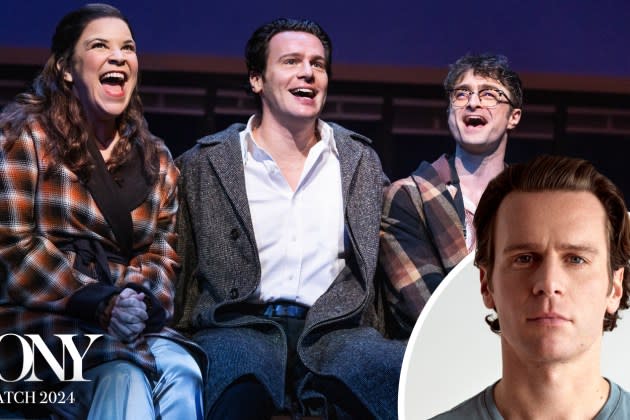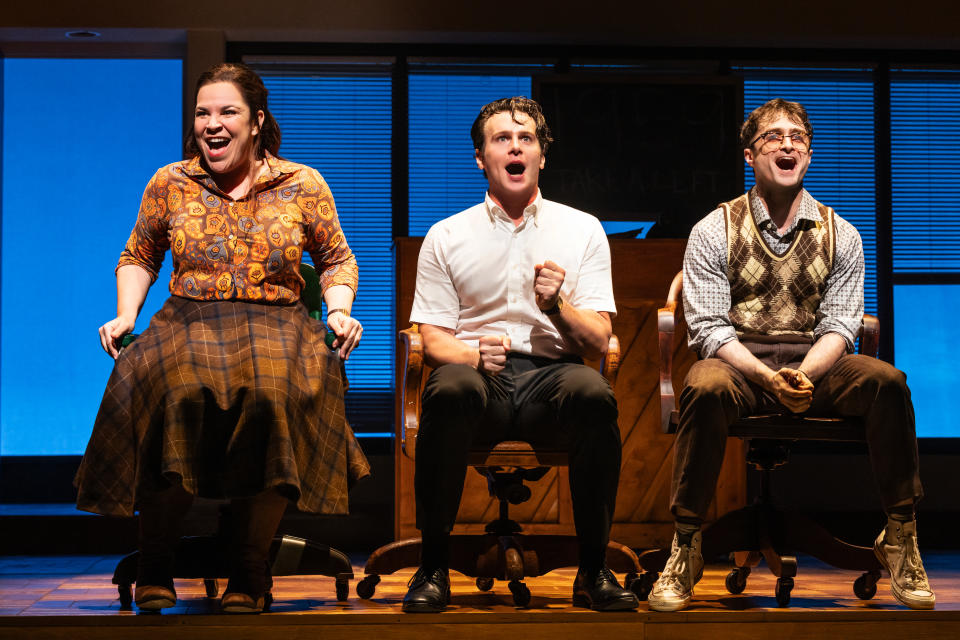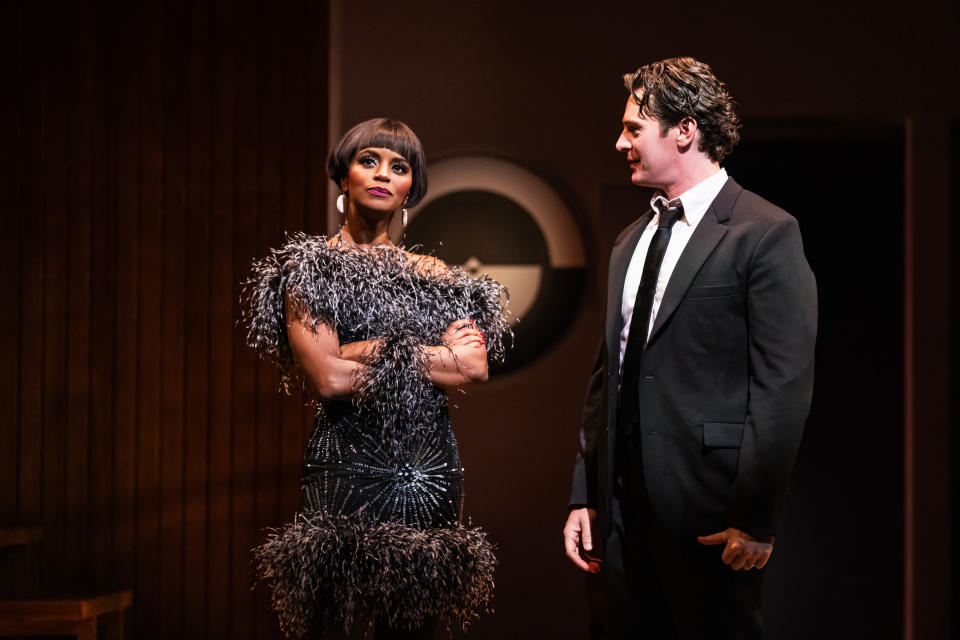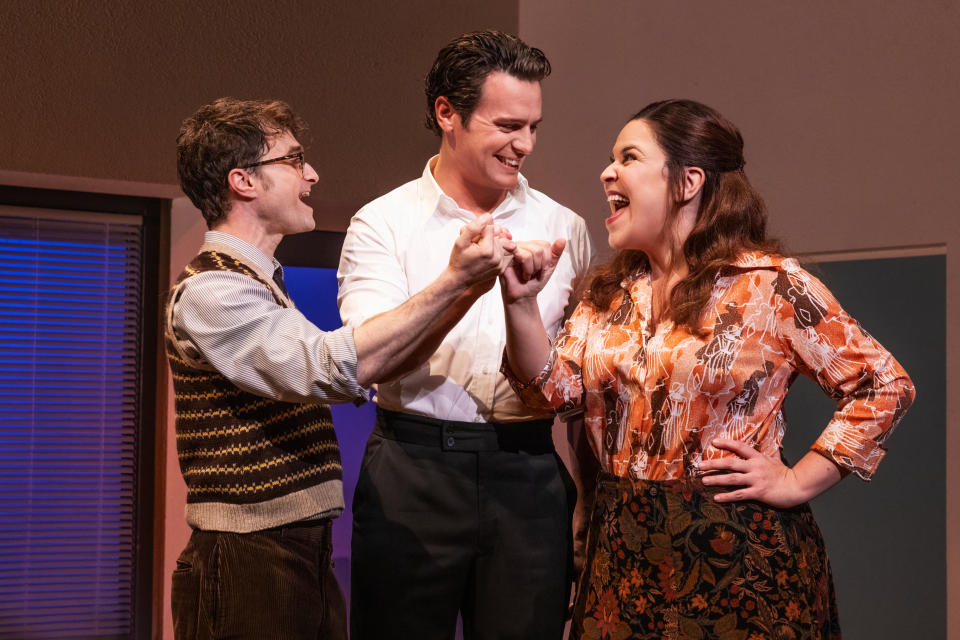Even Jonathan Groff Had To Win Over Audiences: How ‘Merrily We Roll Along’ Went From Sondheim Also-Ran To Runaway Smash – Deadline Q&A

Director Maria Friedman’s staging of Merrily We Roll Along, both on Broadway and its previous run Off Broadway, just might be the most unexpected success in the long, glorious career of composer and lyricist Stephen Sondheim. Long considered all but unstageable, with its hard-to-crack reverse chronology and characters whose flaws are front and center at the start of the show only to soften by the end – again, a reversal of what we’re used to – Merrily We Roll Along rewinds the lives of three show business friends from their sadly splintered end to their heartbreakingly optimistic youth. In other words, a sad ending is inevitable, a happy beginning bittersweet.
And yet the revival has become one of the Broadway season’s biggest no-doubt-about-it hits, garnering seven Tony Award nominations, and is so popular that in March, six months after its first preview, producers announced that Merrily had recouped its $12 million capitalization, a rarity on Broadway.
More from Deadline
Broadway's Tony-Nominated 'Appropriate' Gets Third And Final Extension
Audra McDonald Takes Rose's Turn In Broadway 'Gypsy' Revival
Of course, it hasn’t hurt the production that those three lead actors are some of the most likable, even beloved young stars of stage and screen, with individual built-in fan bases that might have gotten the show to sell-out status even if the critical reviews hadn’t been universal raves. When promotional material and ad posters began popping up in New York City, the photos used were not production shots, but seemingly candid photo booth-style images of the three actors doing nothing so much as enjoying one another’s company.
In this interview, Groff speaks to Deadline about those photos and their importance to setting up audience expectations for a show that even he knew might be a tough initial sell. Weeks into the Off Broadway staging in 2022, Groff sensed something like reluctance on the audiences part, particularly as it related to his not-always-so-likable character. What happened next, and what he learned from it, is best left for him to tell.
The production has been nominated for seven Tony Awards: Best Leading Actor/Musical (Jonathan Groff); Best Revival; Best Featured Actor/Musical (Daniel Radcliffe); Best Featured Actress/Musical (Lindsay Mendez); Best Sound Design/Musical (Kai Harada); Best Direction (Maria Friedman); Best Orchestrations (Jonathan Tunick).
Merrily We Roll Along is playing at Broadway’s Hudson Theatre through July 7
This interview has been edited and condensed for clarity and length.
DEADLINE: Forgive me in advance if I ask some of the same questions that you’ve been asked a million times this Tony season, and if there’s anything you haven’t been asked and want to be asked, I’m open to suggestions.
JONATHAN GROFF: Honestly, talking about this show has not gotten old. I love it so much. I love talking about it so much. Even all the same questions, I’m happy to go through them in the moment.

DEADLINE: Something I’m curious about. Merrily is a notoriously problematic production to stage. Until this one, people said it just couldn’t be cracked. So if you had to pinpoint one thing that you think was the key to unlocking this show, what was it?
GROFF: See, no one’s really asked that, not that exact, specific question. If there was one Jenga piece of this production that if you pulled it out the whole thing would crumble, that one element to me is Maria Friedman, our director.
She had directed a version of this production 12 years ago at Menier Chocolate Factory that transferred to the West End, and they did a capture of back in I think it was 2013. When I was asked to come on board for this New York production of the show, I went on YouTube and I watched Maria’s production in the West End, and I was truly blown away by it. Maria had known Sondheim as an actress…She was the first Dot in Sunday in the Park with George in the ’80s over in London, and so, she knew him as an actress, and she also knew him quite closely, ultimately, as a person and as a friend. A lot of flak that the show had gotten in earlier productions was that the characters were unlikeable and bitter and jaded, and I think it’s no mistake that it took a female director to see past all of the cynicism of the relationships and the characters and go to the core of it all, which is love and friendship.
When we were in rehearsals in the early days, she would say, I’m not interested in the show biz elements of this story. I’m interested in the relationships and the friendships and the collaboration, and I think that that’s really what cracked it.
DEADLINE: Part of her insight extends to casting, clearly. Because the characters have always been interpreted as unlikable, a huge responsibility falls on casting to hire likable actors, actors that have the audience on their side right from the start. I can’t imagine anyone disagreeing that you, Daniel and Lindsay have something that has us on your side from the get-go. What do you think that thing is?
GROFF: It’s been sort of evolutionary. When we were downtown in previews, people were coming to see the show on Fourth Street at the New York Theatre Workshop, but in the first several weeks the energy from the audience was different than what came after we officially opened, and it was certainly different than the energy we’ve been experiencing since we started on Broadway. When we were starting Off Broadway, we hadn’t done a lot of publicity for the show, and the audiences, at least in my memory and experience of it, were quieter at the top half of the show throughout the first act, and I could feel the distaste for my character of Frank in particular. After we opened and once we moved to Broadway and the show was marketed as the three of us and our faces were plastered on the front of the theater, the audience then knew they were coming to see a show about a group three friends. From that point on, I’ve felt warmth from the audience, even during the first scene when the character of Frank is cheating on his wife and being kind of rude to his old friend. There’s still a kind of openness from the audience on Broadway that was not there in the early weeks Off Broadway. And I think partially that’s because of the marketing and because of the energy around the show that people approach us with more of an open heart.
Now, when it comes to the chemistry of Dan and Lindsay and I, Maria had cast the three of us separately, and actually I think Daniel Radcliffe’s casting as Charley in Merrily was the last official green light of casting that Sondheim gave for one of his shows before he passed away. It’s kind of a special honor that Dan has, which is pretty cool. So, Dan was cast, and then me, and then Lindsay, but we’d never really been in a room together until the first day of rehearsal, and we really began vibing from the beginning, and then we really had that gift of getting to play this show for three months Off Broadway and then seven months off before Broadway.
So by the time we came back to do the show on Broadway, Dan had had a baby at that point with his partner Erin, and we spent time together socially between the Off Broadway and Broadway runs. So, by by the time we hit the stage on Broadway, we didn’t really have to reach in any way for the connection and the friendship.

DEADLINE: That’s interesting because the show’s marketing started featuring snapshots of you, Daniel and Lindsay, possibly in or out of character, happy and laughing, as friends. So even if your character of Frank seems rather a terrible person at the beginning of the show, the audience has already been given permission to experience you in a different way, as one of three very good and happy friends.
GROFF: I think you’re exactly right. You just articulated it perfectly. When we did that photo shoot, it was in the basement of New York Theatre Workshop, and I remember putting on turtlenecks, and we did it in one of the rehearsal spaces on the ground floor, in a little photo booth. We thought we were just taking pictures, we didn’t know they’d end up being on the front of the theater. We had no idea that they were going to be the poster and the marquee of the theater on Broadway, and it just worked out that [producers] ended up liking those pictures, and a part of what they liked about them was – and what’s so smart about that marketing – is the depiction of three friends. There’s something simple and pure about those photo booth photos that are immediately recognizable and understandable to people, and it does give the audience a way in, of knowing that they’re going to see a story of a friendship. Those pictures have nothing to do with composers and lyricists or writers or Broadway or the lights of Broadway or the rooftop where the characters meet. They’re just such a great distillation of Maria’s conceit for the show, which is about, let’s focus and put a magnifying glass up to these relationships. That’s what’s going to make the show universal and relatable. It was sort of deft marketing choice, using those pictures. Because Merrily starts in such a dark place, maybe those pictures have subconsciously put in a little hope in the backs of the audience’s mind.
DEADLINE: Do you find, as an actor when you get in the…
GROFF: See Greg, I haven’t talked about any of this before.
DEADLINE: Okay, then, next question. When you started feeling that initial reaction during the early shows that the audience was maybe not liking your character so much, do you change your performance? Or do you just hope the audience will come around?

Krystal Joy Brown, Groff
GROFF: That’s the challenge, or certainly was a challenge for me. Historically – and I’m trying to change this about myself – but historically I have been a people pleaser, and I think probably most of us, as actors, want to be liked. I remember in one of the two books Sondheim wrote, where he does a section on Merrily, and in the lyrics to “Growing Up,” which is a song the character of Frank sings about halfway through the first act, Sondheim’s writing in the annotation on these lyrics, saying this is the first time that that he’d waited until 30 minutes or so into a show to let us into the emotional life of one of the central characters. Frank, up until this moment, is a bit of an enigma and a bit of a mystery to the audience.
Maria was really pushing us, and especially me and Krystal [Joy Brown], who plays Gussie, when we were downtown, because we could really feel like that first scene is tough. We’re really showing a quite ugly side to our characters here, and Maria really encouraged us to hold steady and dig in and be brave enough to be unliked at the beginning of the show.
And it started out feeling really uncomfortable for me when we were Off Broadway in that first week or two, but then I started to love it. The tide shifted. Granted, it’s the gift of going in reverse and the audience eventually getting to see how he ended up making the choices that he made. So, there is, perhaps, some sort of validation at the end of the story for for his behavior at the beginning of the show, but even so Maria’s advice to hold steady and dig in started to feel quite empowering to me.
As I get older and further along in my career as an actor, understanding the value of getting out of my own way in my ego as an actor, and the value in leaning into giving it up to whatever is best for the story as opposed to whatever is sometimes the most comfortable thing for me as an actor. There’s something really liberating about that. Not needing the audience’s approval for the first 30 minutes of the show is a real revelation to me note just as an actor, but as a general note for myself.
DEADLINE: Had you ever felt not liked in a character before? I supposed there’s the king in Hamilton, of course, but he’s a comic villain who becomes an audience favorite.

GROFF: Completely. Coming out as the King, that was a unique challenge in its own. First of all, I was replacing a beloved actor Brian d’Arcy James who left a week after the show opened Off Broadway at the Public Theatre, and I came and started with them. So, that was a whole unique experience of replacing an actor and having no rehearsal, really. I only had two days of rehearsal before I went in, and sort of rehearsing and finding the character in front of an audience. While the audience was tickled, always, to see the king, there was a level of confidence to required to come out in the middle of Hamilton and have a kind of, like, diva energy. Being surrounded by such brilliance took a lot of fake-it-till-you-make-it. For me, to just come out there and stand and not move and sing and then drop the mic and walk away was like, okay, I don’t feel like a diva, but I’m going to pretend like I am. And it’s the same thing sort of with Frank – just tell the story of the show and get over myself.
DEADLINE: This is your third Tony nomination. Does it feel different than the other two?
GROFF: I think Sondheim was writing something almost painfully personal, and so how that relates to my reaction to the Tony nomination is that I’m deeply introspective right now, and the morning of the nominations, I was sitting on my couch in the living room of my apartment watching the TV, waiting to see what might happen for us, and it was celebratory and calling and texting all of our friends on the show, and it felt quite joyful and exciting, and then we got to the theater that night and it felt like a rock concert, quite celebratory and amazing and exciting, and we were all jumping up and down backstage and screaming and all of that, and then I was in the middle of singing the song Growing Up, which is that song I was referring to earlier that Frank sings maybe 30 minutes or so, 45 minutes, into the first act, and I got to the line “so, old friends, don’t you see we can have it all?” And I started to cry, and I could not stop crying. There was something on a personal level, just being on Broadway in a Sondheim show and the Tony nomination and all my childhood dreams are coming true, have come true. And a show that 40 years ago, you couldn’t give away tickets to and was such a sore spot in Sondheim’s artistic life…

And now here we are with seven Tony nominations for this show? I started hysterically crying. I came off stage. I had to slap myself across the face before I came out for the next scene. Like, Groff, f*cking get your shit together, and then I finished the first act, came into my dressing room at intermission and was just hysterically weeping for several minutes. I got it out and then could come out and do the second act.
But it’s still just very emotional right now, because I think it’s the introspective nature of the show, and that we’ve all been working on this together for two years so there’s a real kind of familial energy with the whole company, and then, on top of it all, it’s just a f*cking miracle. This musical is over 40 years old and I can’t think of another example of a musical that has had this second shot and has been embraced in this way. It’s feels so special, and it’s just incredible to be a part of it. You know, at my high school science fair I had my legs propped up on a desk, literally reading a Sondheim biography.
Best of Deadline
'Knives Out 3': Everything We Know About The Second Rian Johnson Sequel
Hollywood & Media Deaths In 2024: Photo Gallery & Obituaries
2024 Premiere Dates For New & Returning Series On Broadcast, Cable & Streaming
Sign up for Deadline's Newsletter. For the latest news, follow us on Facebook, Twitter, and Instagram.

 Yahoo News
Yahoo News 
